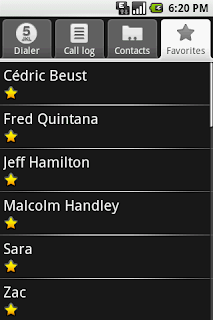As an engineer on mobile, part of my job includes testing multiple phones. Having to add and update contacts whenever I get a new phone is one of my least favorite things to do. Switching phones is such a hassle in no small part because manually adding my friends' contact information takes so much time.
In the early days of developing Gmail and Contacts for Android, the team set a clear goal to make this problem disappear once and for all. We envisioned a world where your various computers and phones would always be in sync without needing discipline, USB cables, Bluetooth, and synchronization software.
It occurred to us that the best way to synchronize these various pieces of information is to let the device do it on its own while you're not looking, so you never have to think about it. Once you've logged into your Google account on an Android-powered phone it automatically synchronizes all your contacts and Gmail information so everything is always available, regardless of where you are and whether you have cell coverage. Since all your contacts and mail are backed up to the network, they will still be available if you get a new phone or just have multiple phones.
You will also find that Gmail on Android preserves all the nice functionality that you are used to on your desktop, such as starring, archiving, assigning and reading labels, and the conversation view that makes reading email on Gmail so pleasant. You can also configure which labels you want to synchronize to your phone and how much data you want there. More than ever, you are in control of the data that you want to find on your phone. Gmail even syncs your drafts so you can begin a message on the phone and send it from the web, or vice versa. With push email, Gmail offers real-time, two-way synchronization of your email, notifying you of new e-mails even when you're using another application.
Of course, your contacts list in Gmail also syncs to the phone, and any changes you make on the phone sync to your contacts list on the web.
 Because this synchronization works in both directions, you can add a contact on the web and almost immediately use it to call the person from your phone. Once you get used to automatic synchronization, you'll wonder how you could ever live without it. We certainly became addicted to it, and we hope you will too!
Because this synchronization works in both directions, you can add a contact on the web and almost immediately use it to call the person from your phone. Once you get used to automatic synchronization, you'll wonder how you could ever live without it. We certainly became addicted to it, and we hope you will too!
It occurred to us that the best way to synchronize these various pieces of information is to let the device do it on its own while you're not looking, so you never have to think about it. Once you've logged into your Google account on an Android-powered phone it automatically synchronizes all your contacts and Gmail information so everything is always available, regardless of where you are and whether you have cell coverage. Since all your contacts and mail are backed up to the network, they will still be available if you get a new phone or just have multiple phones.
You will also find that Gmail on Android preserves all the nice functionality that you are used to on your desktop, such as starring, archiving, assigning and reading labels, and the conversation view that makes reading email on Gmail so pleasant. You can also configure which labels you want to synchronize to your phone and how much data you want there. More than ever, you are in control of the data that you want to find on your phone. Gmail even syncs your drafts so you can begin a message on the phone and send it from the web, or vice versa. With push email, Gmail offers real-time, two-way synchronization of your email, notifying you of new e-mails even when you're using another application.
Of course, your contacts list in Gmail also syncs to the phone, and any changes you make on the phone sync to your contacts list on the web.
 Because this synchronization works in both directions, you can add a contact on the web and almost immediately use it to call the person from your phone. Once you get used to automatic synchronization, you'll wonder how you could ever live without it. We certainly became addicted to it, and we hope you will too!
Because this synchronization works in both directions, you can add a contact on the web and almost immediately use it to call the person from your phone. Once you get used to automatic synchronization, you'll wonder how you could ever live without it. We certainly became addicted to it, and we hope you will too!
No comments:
Post a Comment